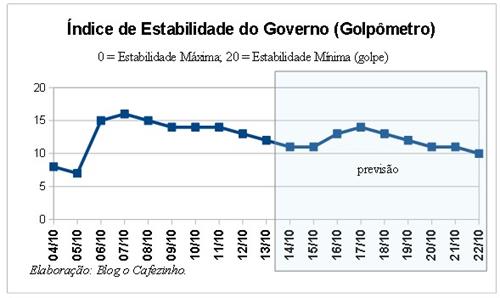
Daily analysis of Brazilian political scenario – October 13th
By Miguel do Rosario, Editor of Cafezinho
(Translation by Eduardo Pagnoncelli)
Brazilian political history has hardly ever been so suspenseful as it currently seems to be.
A constitutionally based ruling taken by Brazil’s Supreme Court judge Teori Zavascki has frozen the opposition’s impeachment efforts, especially the attempts from Lower House president, Eduardo Cunha. This decision was a great “goal” scored by the government’s “team”, with an injunction sought by federal deputy Wadih Damous of the Workers’ Party (PT).
The “game’s” situation is still clear for everyone to see. On the Lower House website Mr. Cunha stated that will keep trying new maneuvers to take the president down, even though she has been elected by 54 million voters.
This connection between the impeachment plans and Eduardo Cunha, however, is the last thing that the opposition needed. The fact that a heavyweight such as Mr. Cunha – who is seen as a corrupt man – is leading the attempts brings instant discredit to the whole process, making it look like a dirty coup attempt.
The most prudent representatives from the opposition parties have already understood that an impeachment process could only succeed if it looked as clear as water. And it won’t look like that, given the strong reaction from many jurists who are questioning the legality of the process, and also due to the brave political resistance by the pro-government lawmakers in Congress.
Brazil’s Central Bank weekly bulletin called Focus (a survey with analysis of the private sector of the country’s economy) has been published today. Although it brings some bad economic news, it is giving some signs of light at the end of the tunnel. Unsurprisingly the media only explored the bad side of the bulletin.
The financial markets estimate a yearly inflation rate of 9.7% in 2015 – a similar number to their previous calculations. But when it comes to 2016 – and this is important – the market is still estimating below-target inflation rates, something around 6.0%
The numbers estimated for Brazil’s exchange rates at the end of 2015 were stable at 4 reais. The fact that it hasn’t varied after one week shows stability. Next year’s prognostics also don’t indicate any kind of tragedy in the exchange rates: 4,15 reais per dollar. Nevertheless, this is one the weakest estimations, as the exchange rates depend on an endless amount of variables.
Now let’s have a look at some positive data that the media pretends not to see.
The market has significantly raised its expectations on Brazil’s current account. While four weeks ago the private representatives predicted a deficit of US$73.5 billion, today their estimation fell to US$65.5 billion.
The current year’s trade balance surplus estimations indicated US$10 billion a month ago, and now they have gone up to US$13 billion.
For the year of 2016 the market has estimated that this surplus will almost double to a total of US$25 billion. The previous analysis predicted a bit less, US$20 billion.
This year’s foreign direct investment should amount toUS$61.5 billion, and in 2016 to US$60 billion. These estimations are responsible to keep Brazil on the top of the list of countries that receive the most productive foreign investments in the world.
Considering that Brazil is one the countries that most invest in infrastructure – such as hydroelectric power plants, ports, railways, electrical systems, wind power, oil refineries and oil production – the picture of our country’s situation is not as bad as our antipatriotic media paints.
The government has won a battle against the impeachment attempts at the start of this week. Winning at the Supreme Court helped the government gain a better public image, as the opposition’s plans have now been doomed due to Mr. Cunha being so closely associated with it. His political reputation is way below its dead storage.
Notwithstanding, it is not just about bad reputation. Mr. Cunha can actually get arrested at any moment. And this delay on his arrest helps exposing how partisan our justice is. Were Cunha a member the Worker’s Party (PT) and he would have been arrested a long time ago, along with his wife. Or at least he would have suffered so much public humiliation that he would have already stepped down as Lower House president.
The “coupometre” is still indicating the same for the next following weeks. The possibility of a successful coup is getting weaker this week as the opposition faces the reality of the Congress’ regiment, which makes it really difficult for their coup inspired utopias to prosper. The “coupometre” might hit a higher mark at the weekend, due to the usual forged scandals, but it should stabilize again throughout the upcoming week.
The opposition’s ultimate weapon would be a coup through an unlikely ruling from the Superior Electoral Court. However, it could cause a very serious institutional rupture, so it doesn’t have many chances of happening. And even in case the TSE rules against the government, it wouldn’t be an unappealable decision, like many political analysts seem to believe.
The “coup-attempting season” should still last for a few more months, but its chances of succeeding will gradually weaken with time. Also, the main social-economic forces would show their aversion for an eventual coup against a government that was legally elected and reelected.


